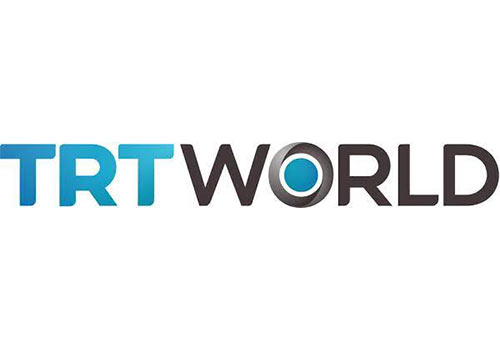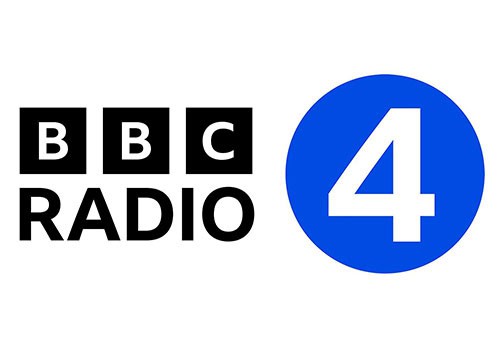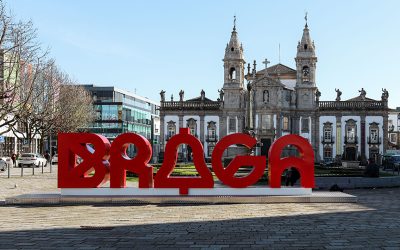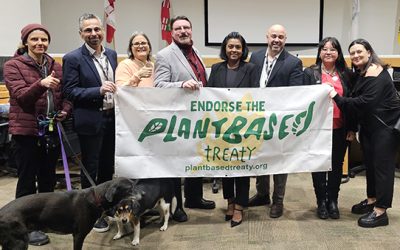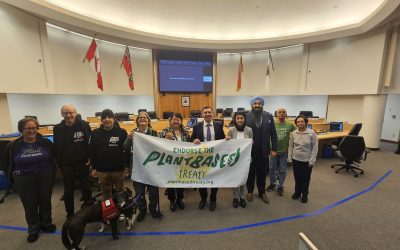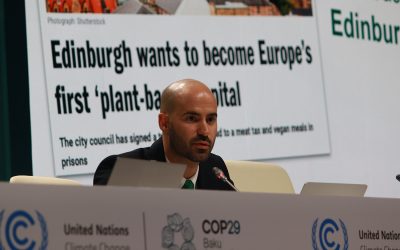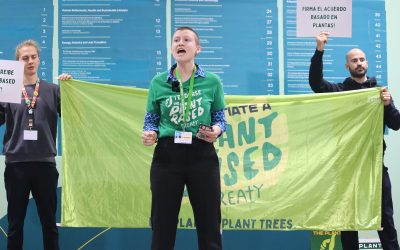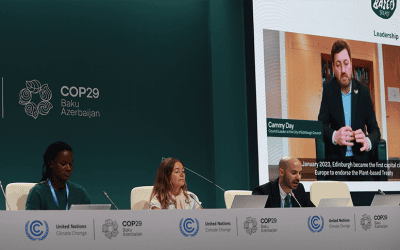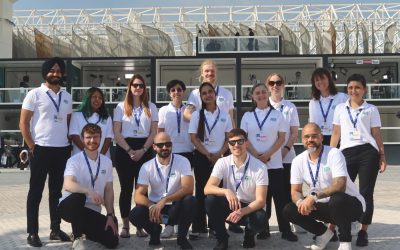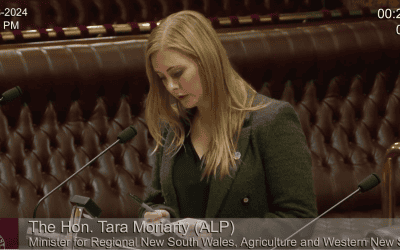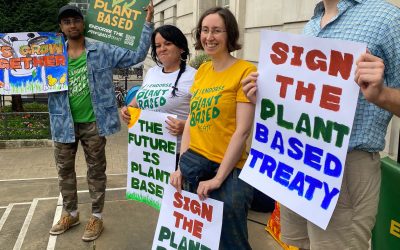March 28, Nijmegen, Netherlands — Nijmegen has joined Amsterdam as the second Dutch city, and 37th globally, to endorse the call for a global Plant Based Treaty. The move will see the city implement measures including a ban on meat advertisements in public spaces and the launch of the Nimma sandwich, sending a strong message that a sustainable and healthy future requires an acceleration of the protein transition.
Cilia Daemen, Alderman for Climate Adaptation and Urban Greening, said, “By signing the Plant Based Treaty, the municipality of Nijmegen supports the global call for cities, organizations, businesses, and residents to help combat the climate crisis by changing their diets.”
Nijmegen Leads in Sustainability
For years, Nijmegen has been at the forefront of climate action and sustainability and received the European Green Capital Award in 2018 from the European Commission. The city ensures that all residents live within 300 meters of green space and promote school gardens by providing subsidies for GGD Gelderland-South, and the advisory institution Experience and Know (Beleef en Weet) assist schools in establishing and maintaining gardens. Currently, 40% of Nijmegen’s primary schools have a garden.
Media Contacts:
- Lea Goodett, Plant Based Treaty Netherlands campaigner: [email protected], +31 6 10055080
- Lisette Weustenenk, Plant Based Treaty Netherlands campaigner: [email protected], +31 6 55516615
- Bart Salemans, City Council Member, Party for the Animals: [email protected]
Media Contacts:
- Lea Goodett, Plant Based Treaty Netherlands campaigner: [email protected], +31 6 10055080
- Lisette Weustenenk, Plant Based Treaty Netherlands campaigner: [email protected], +31 6 55516615
- Bart Salemans, City Council Member, Party for the Animals: [email protected]
March 28, Nijmegen, Netherlands — Nijmegen has joined Amsterdam as the second Dutch city, and 37th globally, to endorse the call for a global Plant Based Treaty. The move will see the city implement measures including a ban on meat advertisements in public spaces and the launch of the Nimma sandwich, sending a strong message that a sustainable and healthy future requires an acceleration of the protein transition.
Cilia Daemen, Alderman for Climate Adaptation and Urban Greening, said, “By signing the Plant Based Treaty, the municipality of Nijmegen supports the global call for cities, organizations, businesses, and residents to help combat the climate crisis by changing their diets.”
Nijmegen Leads in Sustainability
For years, Nijmegen has been at the forefront of climate action and sustainability and received the European Green Capital Award in 2018 from the European Commission. The city ensures that all residents live within 300 meters of green space and promote school gardens by providing subsidies for GGD Gelderland-South, and the advisory institution Experience and Know (Beleef en Weet) assist schools in establishing and maintaining gardens. Currently, 40% of Nijmegen’s primary schools have a garden.
A statement from the city of Nijmegen expressing their Plant Based Treaty endorsement says:
“The way we produce, distribute, process, and consume food has a major impact on the health of humans, animals, and the planet and contributes to the climate crisis. The Plant Based Treaty contains three core principles that contribute to a more sustainable food system and a better climate:
- Relinquish: No expansion of intensive livestock farming and slaughterhouses and no more deforestation for grazing/animal feed production.
- Redirect: Active promotion of a shift to a plant-based food system.
- Restore: Reforestation, ecosystem restoration, and landscape restructuring.
The municipality of Nijmegen supports these principles and is actively committed to healthy and sustainable food. Next year, the Agenda Circular City 2030 and the Vision on Health Nijmegen 2040 will be established, incorporating the theme of healthy, sustainable food. Additionally, various initiatives within the municipality of Nijmegen are already aligned with these principles.”
Nijmegen is launching a plant-based Nimma Sandwich and expanding plant-based options in its own canteens. The sandwich is a collaboration between Radboudumc, Radboud University, MVO Nederland, HAN, Compass, Vermaat, and the restaurant De Nieuwe Winkel. This sustainable sandwich highlights local, natural, plant-based ingredients, with all ingredients sourced from local farmers and producers contributing to Nijmegen’s goal of achieving a protein transition and shortening supply chains.
Starting in 2025, the city will implement a ban on advertising fossil fuels and meat products in public spaces such as bus shelters and digital screens. The Party for the Animals Nijmegen, who introduced Plant Based Treaty to Nijmegen, has long advocated banning advertisements for harmful and polluting products and services in public spaces, including meat and dairy products. Similar meat advertising bans have also been implemented by municipalities in Haarlem and Utrecht.
Bart Salemans, City Council Member, Party for the Animals Nijmegen said, “Last year, we put the Plant Based Treaty on the city’s radar. We urged the municipal board to sign it, and now it has happened. By signing the Plant Based Treaty, Nijmegen is taking a great step toward a more animal-friendly and healthier future for all its residents.”
Lea Goodett, Plant Based Treaty Netherlands campaigner, said, “The way we produce, distribute, process, and consume food has a significant impact on our health, the health of the planet, and animals. We applaud Nijmegen for showing climate action leadership by endorsing the Plant Based Treaty, and we are excited to try their Nimma sandwich, which will help promote healthy plant-based food and support local farmers and producers.”
Global Support for the Plant Based Treaty
37 municipalities, including major cities such as Los Angeles, Edinburgh, and Belfast have endorsed the call for national governments to negotiate a global Plant Based Treaty. In the Netherlands, Amsterdam became the first EU capital to sign in January 2024. Over 4,000 businesses and organizations and more than 230,000 individuals, including IPCC scientists and Nobel Prize winners Klaus Hasselmann and Carlos Nobre, support the call for a Plant Based Treaty.
Why a Plant Based Treaty?
The climate crisis demands immediate action. According to the Global Methane Assessment (UN, 2021), methane emissions—one-third of which come from animal farming—must be reduced by 45% by 2030 to prevent a 1.5C temperature rise. The UN Secretary-General referred to the Sixth IPCC Report as a “code red for humanity” and a final chance to avert catastrophic consequences.
Plant Based Treaty has been featured in…
More from the Press Centre
Portuguese cities, Braga and Tavira endorse the call for a global Plant Based Treaty and develop plant-based food strategies to reduce greenhouse gas emissions
Media Contacts:
Noel Santos: [email protected]
[email protected]
Town of Caledon endorses Plant Based Treaty
Media Contacts:
Brampton endorses Plant Based Treaty to limit climate warming and strengthen food security
Media Contacts:
Press conference: Youth urges leaders to phase-out fossil fuels and transition to a Paris-aligned food system
Media Contacts:
Protest inside COP29 urges countries to negotiate a global Plant Based Treaty that has been endorsed by 33 cities including Amsterdam, Los Angeles and Edinburgh
Media Contacts:
Press Conference: 33 Cities want a Plant Based Treaty added to the Paris Agreement – here’s what it looks like in action.
Media Contacts:
33 Cities want a Plant Based Treaty added to the Paris Agreement – here’s what it looks like in action.
Media Contacts:

